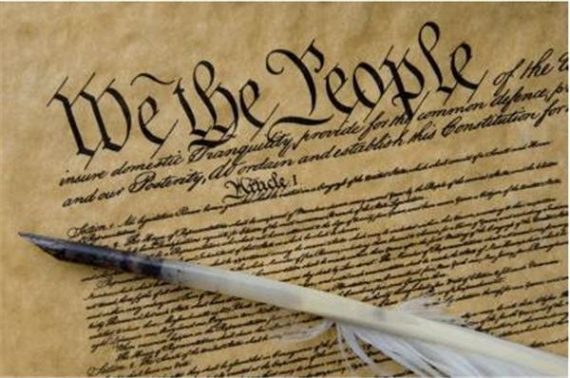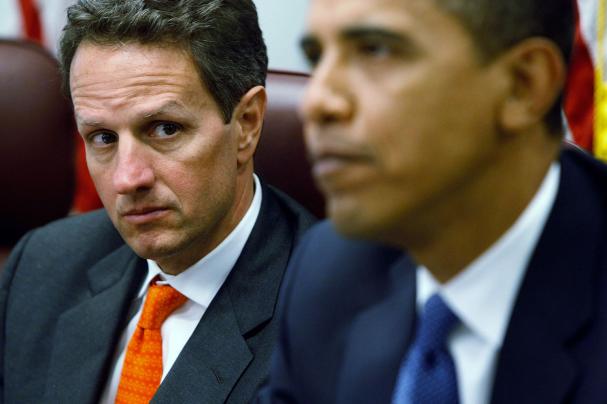White House Rejects “14th Amendment Option” On Debt Ceiling
The White House has apparently rejected using a tortured interpretation of the 14th Amendment to deal with the debt ceiling debate.
The Hufffington Post notes that the White House seems to have ruled out using the powers allegedly authorized by Section Four of the 14th Amendment which has been the topic of much discussion lately:
As quickly as the so-called “constitutional option” appeared as a way to resolve the debt ceiling showdown, top White House officials have apparently closed that door.
During Thursday’s talks between the president’s team and congressional leadership, Treasury Secretary Tim Geithner reportedly revealed that he believed the administration did not have the constitutional authority under the 14th Amendment to simply ignore the debt ceiling and continue borrowing money.
From the very end of a New York Times report, comes the following nugget:
In addition to his warnings about the cost of a default, officials said, Mr. Geithner told the lawmakers the White House did not believe it had the authority, under the Constitution, to continue issuing debt if it reached the debt ceiling. Nobody in the room disputed Mr. Geithner’s bleak assessment, the officials lassaid.
As the HuffPo writer notes, this announcement comes less than 24 hours after a Reuters report seemed to suggest that Treasury Secretary Geithner was still discussing whether to use the option, at least as a bargaining chip in negotiations. Perhaps not coincidentally, it also comes on the same day that Harvard Law Professor Lawrence Tribe pens an Op-Ed piece in The New York Times rejecting the idea that this provision of the Constitution can be used to obviate the need for raising the debt ceiling:
The Constitution grants only Congress — not the president — the power “to borrow money on the credit of the United States.” Nothing in the 14th Amendment or in any other constitutional provision suggests that the president may usurp legislative power to prevent a violation of the Constitution. Moreover, it is well established that the president’s power drops to what Justice Robert H. Jackson called its “lowest ebb” when exercised against the express will of Congress.
Worse, the argument that the president may do whatever is necessary to avoid default has no logical stopping point. In theory, Congress could pay debts not only by borrowing more money, but also by exercising its powers to impose taxes, to coin money or to sell federal property. If the president could usurp the congressional power to borrow, what would stop him from taking over all these other powers, as well?
So the arguments for ignoring the debt ceiling are unpersuasive. But even if they were persuasive, they would not resolve the crisis. Once the debt ceiling is breached, a legal cloud would hang over any newly issued bonds, because of the risk that the government might refuse to honor those debts as legitimate. This risk, in turn, would result in a steep increase in interest rates because investors would lose confidence — a fiscal disaster that would cost the nation tens of billions of dollars.
I made much the same point last week:
Even if this might be Constitutional, though, I’m not at all sure that it’s financially or politically wise. The financial markets are already getting nervous about the debt ceiling debate, turning it into a Constitutional crisis and potential legal showdown between the Executive and Legislative Branches would only serve to spook them more. Politically, it is such an extraordinary step, and such a unique Constitutional argument, that it would only serve to reinforce the Republican meme that the President has taken it upon himself to ignore Congress when it doesn’t sue him (i.e., Libya). Moreover, the American people are already overwhelmingly opposed to a debt ceiling increase, an action like this would probably not go over well unless the Obama Administration explained it well. That is something that, from the stimulus to health care reform to the action in Libya, they have been exceedingly bad at doing. Therefore, the public is likely to react very negatively to what will seem to many to be an unprecedented Executive Branch power grab.
Since the White House has apparently rejected the idea, this is somewhat of an academic argument at this point. Nonetheless, it does remind us that not every solution to our problems can be found in some clause of the Constitution. As Benjamin Franklin is reported to have said as he left Independence Hall at the end of the 1787 Convention, we have been given a republic, if we can keep it. One of the things that means is that we are responsible for filling in the generalities that the Constitution creates, such as how to fund the government, what that money is spent on, and whether or not long term debt is acceptable. We’ve managed to go through the last 40 years or so avoiding those questions by just running up a huge credit card bill. Now that it’s gotten to the point where it is becoming fiscally unmanageable, we’ve got to deal with it, and the pain that will come from it. There’s no magic button we can press to avoid making those choices.






I think Tribe makes the crucial practial point here:
Obama could declare that he has the authority to issue debt over the limit, but there may be no buyers, or if there are buyers they will demand a higher interest rate.
Just from reading about similar debt crisis during the Reagan and Bush II presidencies, it appears to me that by now the Treasury is making decisions intended to minimize the upcoming debt crunch at the expense of the nation’s long-term economic health. I think the POTUS is better advised to begin advertising these problems to keep the pressure on Republicans, and that things will get steadily worse. There is no magic wand.
wow. a pres who actully thinks the constitution means something….
Rightwats must be blowing up…. especially after parroting Dick the Cheney’s “Deficits don’t matter.”
Name me a conservative who actually cares about the deficit, and I will name you a conservative who actually had the balls to tell Grover “Americans for a permanent Deficit” Norquist “Shut the F Up!”
No, I will not hold my breath, Because every GOP politician is as gutless as evey Dem. Still, I hope to survive this next “Republican Armeggedon”….
“Breath deep the gathering gloom
as watch lights fade from every room….”
Obama might just be enjoying the bind the debt ceiling is putting the Republicans in.